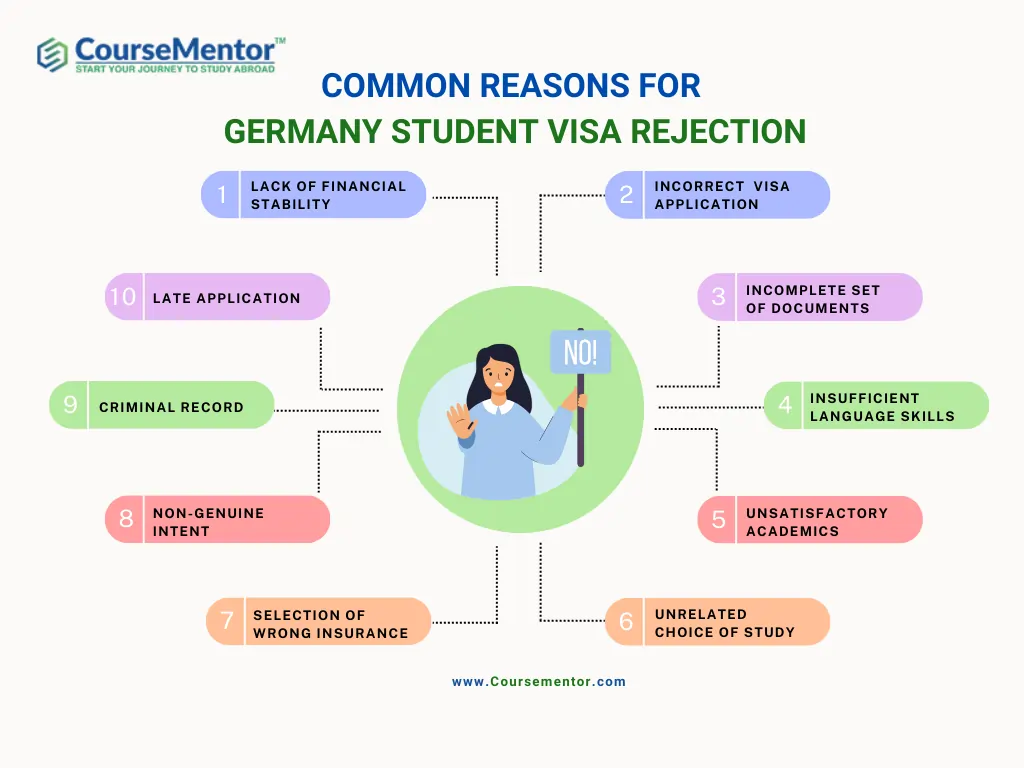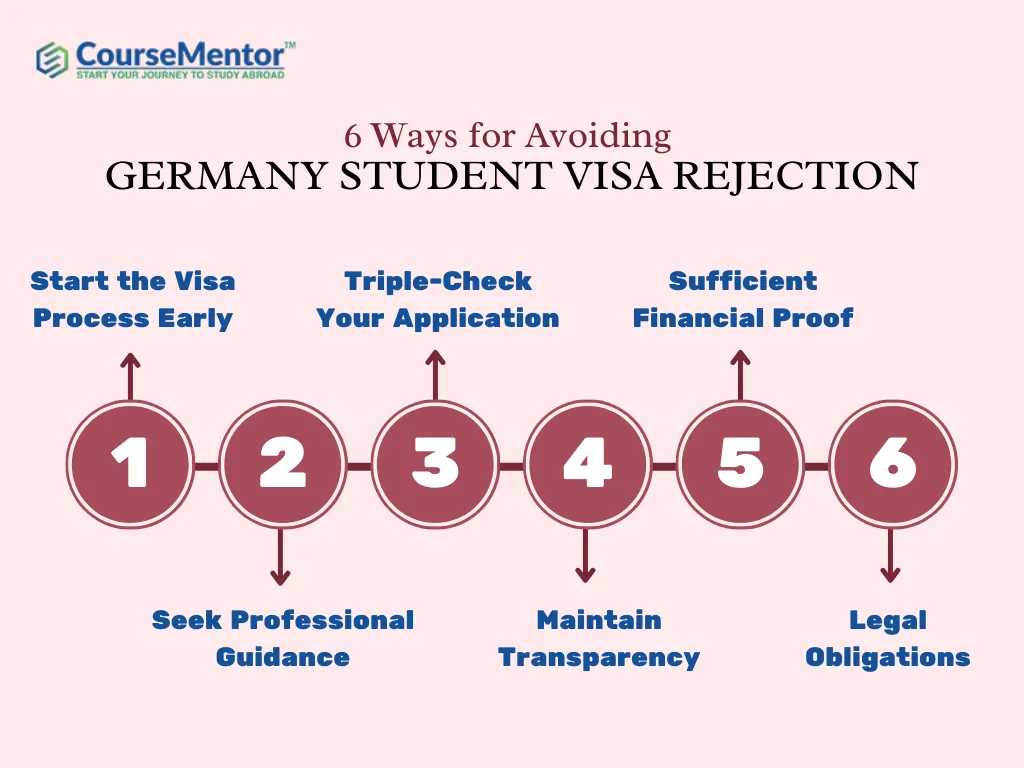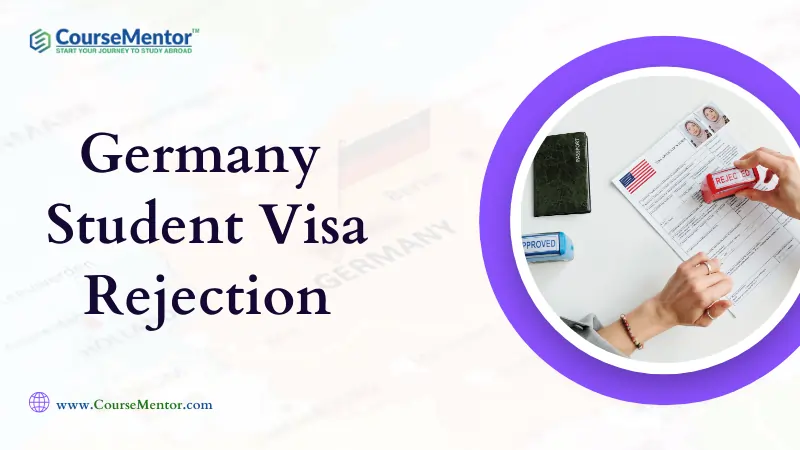Studying in Germany is a dream for many international students due to its world-renowned education system and diverse academic opportunities. However, obtaining a student visa can be a daunting task, and rejection is a harsh reality for some applicants.
Because the journey to securing a student visa can be as formidable as it is rewarding. But many student’s dream comes crashing down with the dreaded news of a visa rejection. Are you also one of those international students who faced visa rejection?
If yes, then don’t worry. In this blog, we will explore the reasons for Germany student visa rejection. Furthermore, we will also offer some valuable tips on how to avoid common mistakes that may lead to such setbacks. So, let’s dive into the article to know the common reasons for visa rejection.
Common Reasons for Germany Student Visa Rejection
Even while the German government rarely rejects student visas. There are, nonetheless, circumstances in which they may do so. The common reasons for Germany Student Visa Rejection Reasons are as follows:

1. Lack of Financial Stability
One of the most common reasons for Germany Student Visa Rejection is insufficient financial proof. Germany requires students to demonstrate that they can cover their living expenses during their studies. Because of that, if an international student fails to provide detailed and accurate financial documentation, it can lead to rejection.
To avoid this mistake, make sure to maintain a well-organized and transparent financial statement with appropriate funds in a blocked account.
2. Incorrect & Incomplete Visa Application
If an international student fills out the visa application incorrectly and incompletely, it becomes another common reason for Germany Student Visa Rejection. To avoid this reason for visa rejection, applicants should carefully follow the application guidelines and provide accurate information.
Furthermore, before submitting the visa application, make sure to double-check all the necessary documents and forms. Because any errors in your application can be seen as a lack of seriousness and can lead to rejection.
3. Incomplete Set of Documents
Submitting an incomplete set of documents is another common reason for Germany student visa rejection. Because each document required to apply for a study visa is important in its way. This might determine whether you get the student visa or not. So, ensure you provide all the necessary documents to avoid the visa rejection.
Related Article: 20+ Best Universities in Germany for PhD: An Ultimate Guide
4. Insufficient Language Skills
Having Insufficient Language Skills might be the common reason for Germany student visa rejection. So, make sure you showcase fluency in the respected language that is needed for the program in which you are applying to convince the officials.
Make sure to provide the necessary language certificates that are needed. For instance, your German language is at a level of B2 to pursue the programs taught in German. This will help you to showcase your proficiency during the visa interview.
5. Unsatisfactory Academics
Germany’s education system is highly regarded, therefore, top colleges carefully consider the students’ applications. While analyzing student’s applications, they look for those with a solid academic background and the ability to finish their degree programs successfully. That’s why it is crucial to maintain a good academic record. Because the poor performance in previous education may result in visa rejection.
6. Unrelated Choice of Study
Unrelated Choice of Study is another common reason for Germany Student Visa Rejection. It can occur if the course the student selects is irrelevant to the applicant’s previous academic background.
For instance, the student holds a bachelor’s degree in Information technology and applies for a Master’s in Business Administration in finance program in Germany. Due to this, the embassy may question the student regarding their ability to pursue and complete the chosen program. Moreover, visa rejections can also occur if a student applies for the same level of education.
7. Selection of Wrong Insurance
The choice of selection of wrong insurance also becomes a common reason for Germany Student Visa Rejection. Because health insurance is mandatory for all students in Germany. Not having valid health insurance coverage is a surefire way to get your visa rejected.
To avoid this mistake, ensure you have comprehensive health insurance. Provide proper documentation with your visa application to get your student visa timely.
8. Non-Genuine Intent
German authorities closely scrutinize your genuine intent to study in Germany. If they suspect that your primary motive is something other than education, your visa may be rejected. To overcome this, maintain clarity in your visa application and provide strong reasons for choosing Germany as your study destination.
9. Criminal Record
A criminal record or a background check that raises concerns can lead to visa rejection. You must disclose any previous convictions or legal issues in your application. Hiding this information can result in visa denial and further legal consequences.
10. Late Application
Applying too close to your program’s start date can be a reason for rejection. Apply for your student visa well in advance to allow sufficient processing time. Late application can also be the reason for a germany study visa rejection.
All these reasons, such as lack of financial stability, incomplete set of documents, having a criminal record, etc, are the reasons for getting Germany Student Visa Rejection. To avoid visa rejection, focus on some ways to avoid common mistakes.
Related Article: Intakes in Germany for International Students in 2024
6 Ways for Avoiding Germany Student Visa Rejection
The common ways that a student should avoid while applying for German student visa are as follows:

1. Start the Visa Process Early
Applying for a student visa in Germany can be a time-consuming process. To avoid last-minute rush and potential mistakes, start the application process well before your intended study date.
2. Seek Professional Guidance
Consider seeking help from experienced immigration consultants or education agents specializing in Germany. They can guide you through the application process, ensuring that all requirements are met.
3. Triple-Check Your Application
Before submitting your visa application, meticulously review it for completeness and accuracy. Correct any errors, and make sure all required documents are included.
4. Maintain Transparency
Be transparent in your visa application and provide all necessary information, even if it may seem unfavorable. Dishonesty can lead to visa rejection and have long-term consequences.
5. Sufficient Financial Proof
Ensure you have enough funds in a blocked account or provide evidence of a scholarship or financial support to cover your expenses throughout your studies.
6. Legal Obligations
Abide by the German immigration laws and requirements. Ensure your health insurance, visa validity, and other legal obligations are met.
To increase your chances of obtaining a student visa for Germany, it’s essential to carefully review the visa requirements, prepare all necessary documentation, and present a clear, honest, and compelling case for your study plans in Germany.
If your visa is rejected, you may have the option to appeal the decision or reapply with the necessary improvements. Consulting with the German embassy or consulate and seeking guidance from experienced advisors can also be helpful.
Also Read: How Much PTE Score for Germany is Required?
Final Words
Receiving a rejection for your German student visa can be disheartening, but understanding the reasons for these rejections and taking steps to avoid common mistakes can significantly improve your chances of success. By following the guidelines provided in this blog, you can better prepare for the application process and increase your chances of obtaining that coveted student visa for Germany.
Remember, preparation, honesty, and attention to detail are key to a successful application process. I hope the topic discussed in this blog on the common reasons for Germany Student Visa Rejection and ways to avoid these common mistakes. Do revisit to read more related content and information on studying abroad.
Frequently Asked Questions (FAQs)
What happens if a Germany Visa is rejected?
If a Germany visa is rejected, the applicant will receive a rejection notice explaining the reason for the denial, and they may have the option to appeal the decision or reapply with necessary improvements.
How to Re-Apply for a Germany Student Visa?
To re-apply for a Germany Student Visa, carefully address the reasons for your previous rejection, gather all required documents, and submit a new application with improvements in those areas.
What to do after German Student Visa Rejection?
After a German student visa rejection, you can consider reapplying with improved documentation and addressing the specific reasons for the initial rejection.


